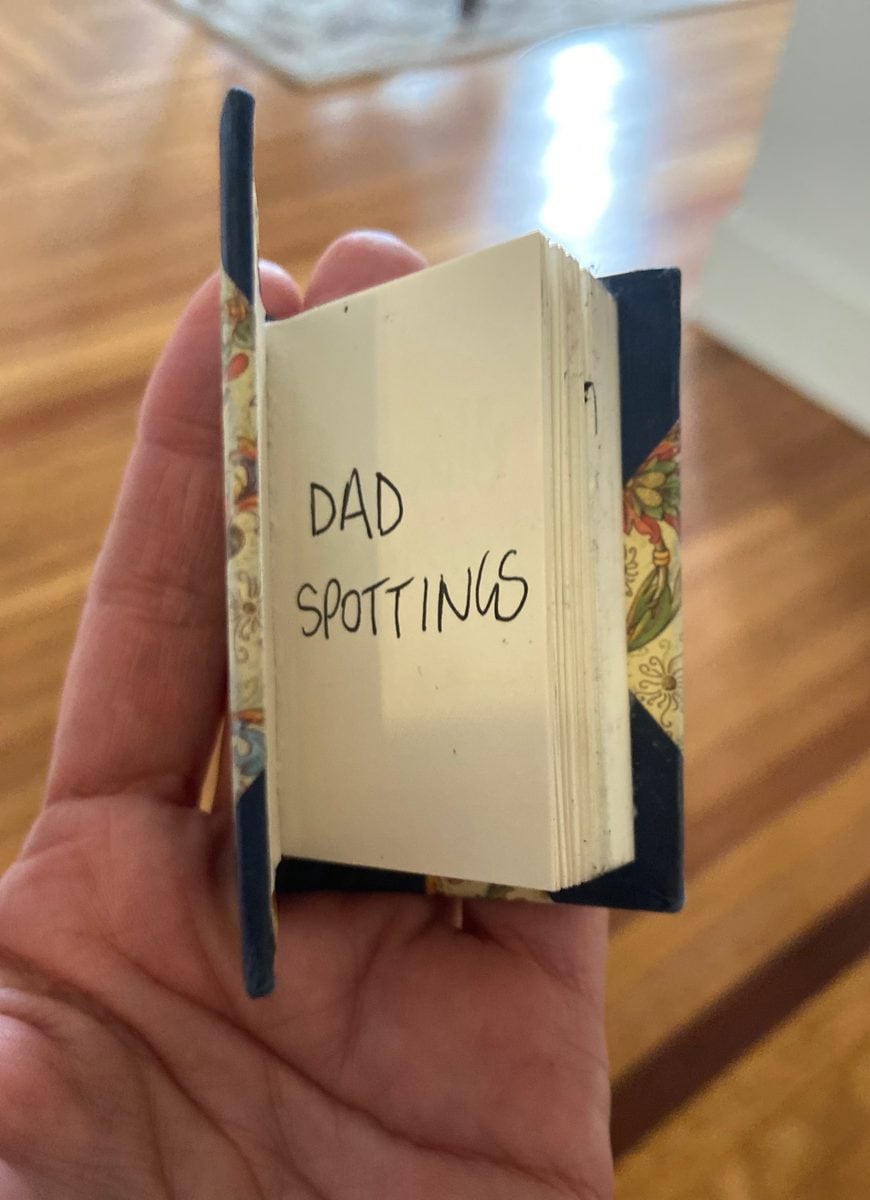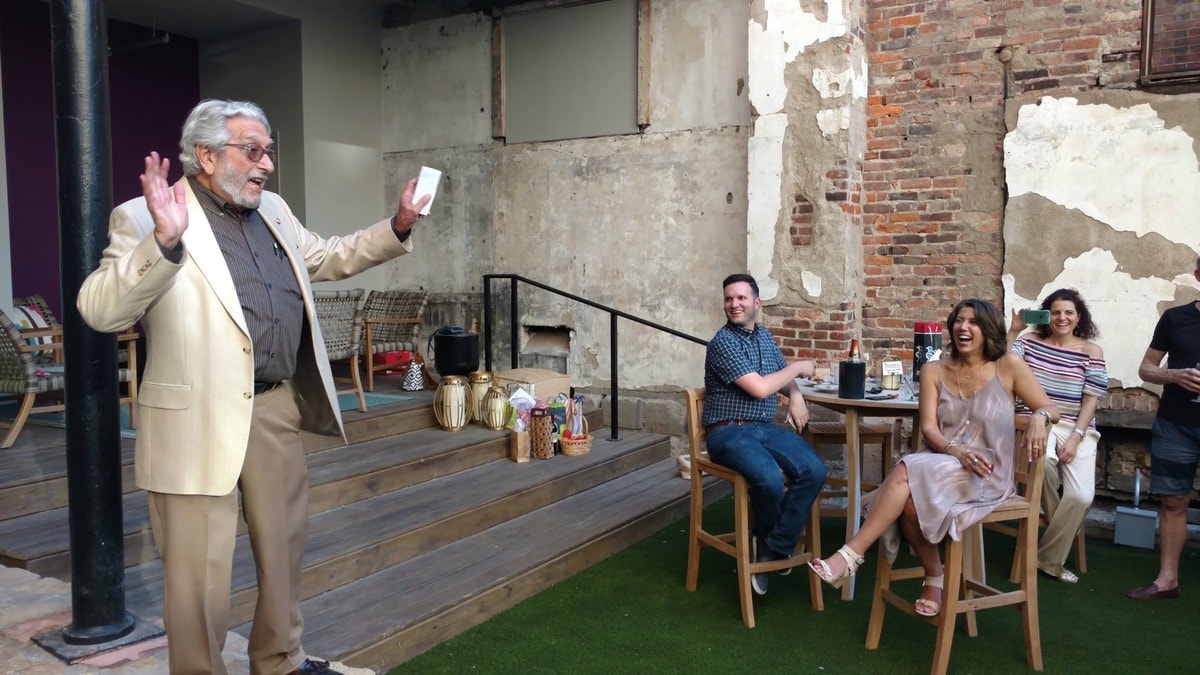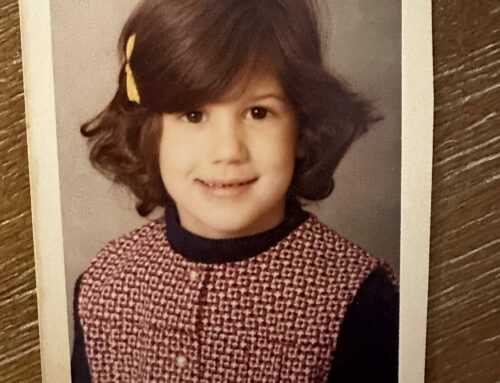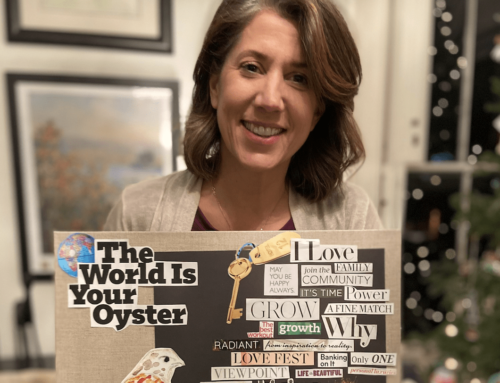The photo above is from Blink, a city-wide art projection festival in Cincinnati and Covington. This is the Cincinnati Museum Center with a man wearing a sports coat, arms raised victoriously. It was my first “Dad Spotting.” I’d like to believe it was my dad assuring me, “Hey, I’m good. Just hanging out in one of my favorite places.”
I’m no expert on grief, except that I’ve experienced it. We all have – to some degree. When my father died last September, I wasn’t prepared for the grief that followed. I hated it. It was hard. I just wanted “get through it.” As with most people, my grief was defined as sadness, loss, missing someone, wishing they weren’t gone. You know… That’s how we define grief. It’s a process of letting go, right?
What I didn’t expect was all the other emotions that surge… Anger. Isolation. Fear. Loneliness.
I was now without my Dear Ol’ Dad and my world would never be the same. He knew me in ways that others didn’t. He’d tell the same stories and stupid dad jokes. He laughed from the shoulders up – which made the whole family chuckle. He was always reading a new book and planning a trip or some quest. Even the disappointing aspects of my dad were no more and I missed them all. Any future with my dad was gone. Now only a memories. And I was left to sort it all out.
Life moved on. I went back to work, saw friends, went to dinner, attended parties. During those first few months, all I wanted to do was talk about my dad. “Remember the time…” “Oh, he would have loved this.” “Wish he was here to see this.” But family had returned to their corners of the world – they were the ones who I would have laughed and cried with. I just wanted to talk to someone who knew him and knew him well. Turns out, this is absolutely normal. 100%

A lil book full of <3
A friend gave me this tiny book she brought back from Italy. I decided to capture moments when I felt my dad was near in it. I named it “Dad Spottings.” And I began to write. That helped.
A little over a month after I lost my dad, we met up with friends before going to Blink (see photo above). Everyone was drinking beer, having a good time when I saw a friend and her husband, Craig. Craig had just lost his dad, who died the same day as my dad’s memorial. It was the first time I’d seen them since summer.
I saw Craig across the room and made my way to him. I wanted to give him a hug and express my sympathy. I didn’t know him that well, but we were in the same boat and I wasn’t feeling the “party” atmosphere. I was surprised when Craig, without hesitation said, “Tell me about your dad.” Five simple words gave me permission to laud my dad once again. I can’t remember what I said, but it felt good to talk about him and especially to be asked (and listened to.) When I was done yakking, I turned to him and asked, “What was your dad like?” He told me how they’d watch golf on tv together. How hard it was not to be able to call him to talk about it. We cried a little, wiped our tears and thanked each other. Then we went back to the raucous. I felt better.
That moment was impactful. It reminded me that grief is normal, good AND it can’t be contained to when you are alone. It needs to come out and it’s good when it does, especially with others. Surprisingly, it does not bring them down.
That night also gave me more confidence to not hide in my grief. When things bubbled up, I let them out without embarrassment. Too many of us try to stop this emotional discomfort from happening. We mask or run from the pain. Also normal. But it doesn’t have to be that way. We can create safe places. We must do this for each other.
The more I think about it, the more I see that grief is not just about death. It can be about any loss.
Grief is the sorrow that accompanies “what could have been” or “was” when something good is gone.
Something that may seem small to you, may have significant impact on someone else. Divorce, for example, is a huge loss of something that was once good. Grief accompanies divorce, yet some go on as if it’s no big deal. (It is.) A diagnosis of a terminal illness that changes your entire outlook on life is another. Even a child leaving for college, though good, can be a loss that leaves a hole.
If you’ve ever grieved, then you’ve loved.
Consider this, bereavement leaves are typically just a few days, but it takes months, sometimes much longer to emerge from grief. Heading back to work provides a much needed distraction, but at the end of the day, home can be a lonely place. At some point, it’s “back to normal” for everyone else. It’s anything but that for the person who is grieving.
Not to point out the obvious, but there is a 100% chance of death for all humans. That means one day, we’ll lose someone close to us. Maybe not today, but life is fragile – we can’t say when. We are experiencing that right now as we face COVID-19 ravaging the world around us. People are dying. We are in a hard time. Yet we can give our heavy hearted friends, family and collegues a loving space and a place to just be.
Do this at work (or from afar) so someone grieving knows you care.
- Say something! Acknowledge and welcome people back to work. Shortly after my dad’s death, a woman I’d known for years, who is a the outer edge of my friend circle approached me at Dancefix to simply say, “I’m glad to see you here.” That’s all. I knew what she meant and it was enough. Even if it feels awkward, say something. It’s better than ignoring the elephant in the room.
- Don’t underestimate the impact a loss has had on someone’s life. It may have been a friend, grandma or an uncle who died. That doesn’t mean it’s not as painful as a parent or spouse. Let them feel what they feel – don’t play it down in an attempt to fix it.
- Do something. Drop a note, send a text or email, leave a voice mail, send a card. If you think of someone who is grieving, act on it immediately. Don’t put it off. You may not get a response, but they will know you are thinking of them. That means something. It’s amazing how often someone says how much they appreciated those sentiments months or even years later. We’ve forgotten our gesture, but they haven’t.
- Don’t just say, “Let me know if you need anything.” This is a common sentiment that will rarely be activated. If you want to, just do it. Bring the casserole, drop off flowers, call, send a small gift – whatever you do best, do it. Most people who are deep in grief, will not ask for help. They are overwhelmed and often don’t even know what they need.
- Ask, “How are you doing today?” Not how are things? Or Are you ok? The answer to how are things is, “Things suck and I am not doing well.” The answer to “How are you today?” “…right at this moment?” may be, “Right now, I’m good.” You can also ask, “Can I get anything for you right now?” or “What do you need from me?”
- At work especially, if someone is having a hard time, give them permission to take a break to regroup. Respect those moments where privacy may be needed. If you work in an open space, it may be helpful to find a private space for them for a moment.
- No one wants to cry at work. You can make this so much easier if you just let them cry. Tears come up and then they go away quickly. It may feel uncomfortable in the moment, but allowing a few tears, without judgment or embarrassment, is a gift. They will remember you for it. This may be a good time to offer to sit with them in that quiet space.
- Listen! Remember that conversation I had with Craig? He asked me about my dad. Then he listened. If you ask someone to share, be prepared to listen. Listening lets a person know they are valued. Be present. If you are half hearted or don’t have the time, find another time to have that conversation. If you are in a hurry, let them know you want to hear a few great stories, but later. Then follow up. Set a time if you have to.
There are no one-size methods or timelines with grief. It’s a personal matter. One thing we know for sure is that it’s most intense around the time of the loss. And theoretically, that sadness should lessen over time. But maybe not. Yesterday, I spoke with a woman who lost a child many years ago. She couldn’t talk about it; said it felt as if it happened yesterday. She teared up right there.
Perhaps grief is not supposed to go entirely away? Maybe we just learn to live differently. What I am learning in my time of letting go is that I don’t actually have to “let go.” I can “take forward.” Yes, I am choosing to take the very best of my dad (the good person he was and will always be, the happy memories we shared, the positive traits he passed down to me, and the stories we uniquely shared) and bring that forward.
Walking the walk with you,
Alexia
This blog is dedicated to all who’ve lost a parent – young or old – they are indeed irreplaceable.
 Dad’s long winded and totally predictable toast at my 50th Birthday – June 2017
Dad’s long winded and totally predictable toast at my 50th Birthday – June 2017
Sharing this poignant reflection with you. You are not alone in this: What I know Thus Far






Hello Alexia, thank you for your beautiful writing. It is a great talent to be able to express so gracefully what others may feel but are unable to communicate. And the photo of Mark was a poignant reminder of his wit and humor. Albeit my memories of him are from long ago, he was and is a dearly beloved friend. Thanks for reminding me to follow through on those letters and cards. Take care during this time of world turmoil. Peace.
Yes, Suetta. Be well!
I love the Dad spotting book! My sightings are more hearings in the form of hearing the song “hallelujah “ in random places . I was playing this song on my phone when my dad passed. It was a recording of my youngest daughter was singing it . I love dad sightings. They are still with us and it’s so nice to “see/hear” them and it makes me happy to know u have that experience too. Our Dads continue to make us smile 🥰
Too much to put in one blog – just like you! <3